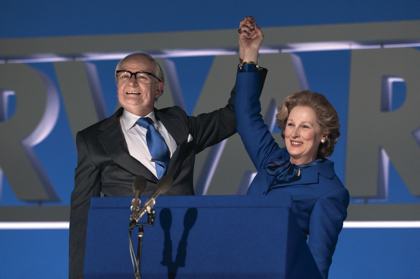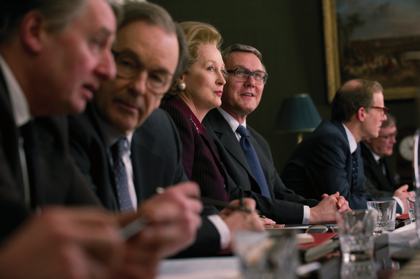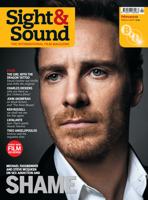Film review: The Iron Lady
United Kingdom/France 2011

Reviewed by Philip Kemp
Synopsis
Our synopses give away the plot in full, including surprise twists.
London, present day. Baroness Margaret Thatcher, the former British prime minister, is now in her eighties and living in her house in Chester Square, looked after by her personal assistant June and her staff. Her daughter Carol visits her regularly. In the early stages of dementia, Margaret imagines that her husband Denis is still with her, though he’s been dead for some years. June encourages her to clear out Denis’s clothes and effects. Margaret recalls the war years when, as the young Margaret Roberts, she idolised her father, a grocer in Grantham, and won a scholarship to Oxford.
Margaret hosts a dinner party. She recalls putting herself forward as a Tory candidate and meeting a young businessman, Denis Thatcher. She loses the election, but afterwards Denis proposes. She stands again in 1959, for the safe seat of Finchley, and is elected. Despite male chauvinism she rises in the party and becomes education secretary. In 1975, having improved her image with the help of Airey Neave and Gordon Reece, she’s chosen as party leader, and in 1979 becomes prime minister. Neave is killed by an IRA car bomb.
At Carol’s urging, Margaret sees her doctor but rejects suggestions that she’s losing touch. Denis reappears and Margaret tells him to leave her alone. As prime minister, Margaret is faced with civil unrest, the miners’ strike and IRA bombs, one of which narrowly misses killing her at the Grand Hotel in Brighton. The Falklands War restores her popularity and she’s re-elected in 1983. Her style of government becomes increasingly autocratic and, despite winning a third election in 1987, she faces opposition within her own party. Her obstinacy over the Poll Tax brings matters to a head, and in 1990 she’s forced to resign.
At Chester Square, Margaret packs up Denis’s effects and his ghost leaves her.
Review
In the opening shot of The Iron Lady an arthritic hand reaches for a pint of milk on a corner-shop shelf – immediately recalling the epithet ‘Margaret Thatcher, milk snatcher’ earned by the then education secretary after she abolished free milk for school kids. And when the elderly Thatcher heads for the counter, she’s elbowed aside by a portly young suit braying into his mobile – precisely, one might think, the kind of insensitive boor bred by her ‘there is no such thing as society’ credo.
Leaving aside the unlikelihood that Baroness Thatcher, with all her staff and security guards, would be allowed to totter by herself down to the local corner shop for her groceries, this scene arouses expectations of a promisingly satirical edge. No such luck. Though it falls short of hagiography – and despite claims in the Daily Telegraph that the film constitutes some kind of malignant leftist smear on the glorious Thatcher era – what director Phyllida Lloyd (Mamma Mia!) and screenwriter Abi Morgan (Shame, TV’s The Hour) have given us is an affectionate and largely depoliticised account of the rise and fall of Britain’s first female prime minister.

“The thing about the film,” Lloyd has said, “is it’s not about policy in any way. It’s all told from her point of view.” Given that Thatcher, right or wrong, was nothing if not a conviction politician, the suggestion that her ‘point of view’ could for a moment exclude policy seems a touch bizarre. Still, the POV approach works well on occasion: Thatcher’s first arrival in the House of Commons, a lone powder-blue-clad female amid a heaving mass of dark-suited males, finding herself directed to the ‘Lady Members’ Room’ (a deserted, carpetless cubbyhole furnished with a sole upright chair and an ironing board), makes its point; this may not be exactly how it was, but it’s easy to believe that’s what it felt like.
Elsewhere, though, the subjective angle risks becoming tiresome. The film’s central conceit – that the widowed Lady Thatcher, suffering the onset of dementia, still sees husband Denis (Jim Broadbent) and talks to him, to the puzzlement of her staff (“Did you say something, Lady Thatcher?”) – would be amusing for five minutes or so. Extended across the entire film, it soon outstays its welcome. And some rewriting of history verges on the farcical. When Airey Neave is blown up by an IRA car bomb, Thatcher, who’s just been chatting to him, is rocked by the blast a mere hundred yards away and rushes weeping to the wrecked car – a cheesily melodramatic fabrication even Hollywood might balk at.
There are compensations. The scene where Thatcher, patiently schooled by Neave and Gordon Reece, modulates her Lincolnshire accent into the deep, condescending swoop of her later years, offers rich comedy, and we get some relishable cameos – not least Richard E. Grant’s Michael Heseltine, prowling the room with wolfish grin as he scents the downfall of the Leaderene. And of course there’s Meryl Streep, once again going far beyond mimicry into total identification with her role, taking Thatcher from the confident stride of her early triumphs to the stiff-legged shuffle of old age. But altogether this is a much softened and declawed portrait of the most divisive prime minister of recent times. Can ‘Margaret Thatcher – The Musical’ be far off?
See also
The Ms-fits: Nick James on Meryl’s Maggie, Michelle Williams’ Marilyn and the Best Actress race (November 2011)
Channelling the past: Alkarim Jivani on 25 years of Channel 4 (December 2007)
The lost leader: Colin MacCabe on Derek Jarman and British cinema in his wake (January 2007)
The Devil Wears Prada reviewed by Liese Spencer (October 2006)
The Manchurian Candidate reviewed by Stephen Dalton (December 2004)
Day in the life: Sheila Johnston on The Hours (February 2003)
Funny games: Andy Medhurst on the new British comedians of the 1980s (November 2000)
Credits
- Director
- Phyllida Lloyd
- Produced by
- Damian Jones
- Screenplay
- Abi Morgan
- Director of Photography
- Elliot Davis
- Editor
- Justine Wright
- Production Designer
- Simon Elliott
- Music by/Conductor
- Thomas Newman
- Sound Designer
- Nigel Stone
- Costume Designer
- Consolata Boyle



